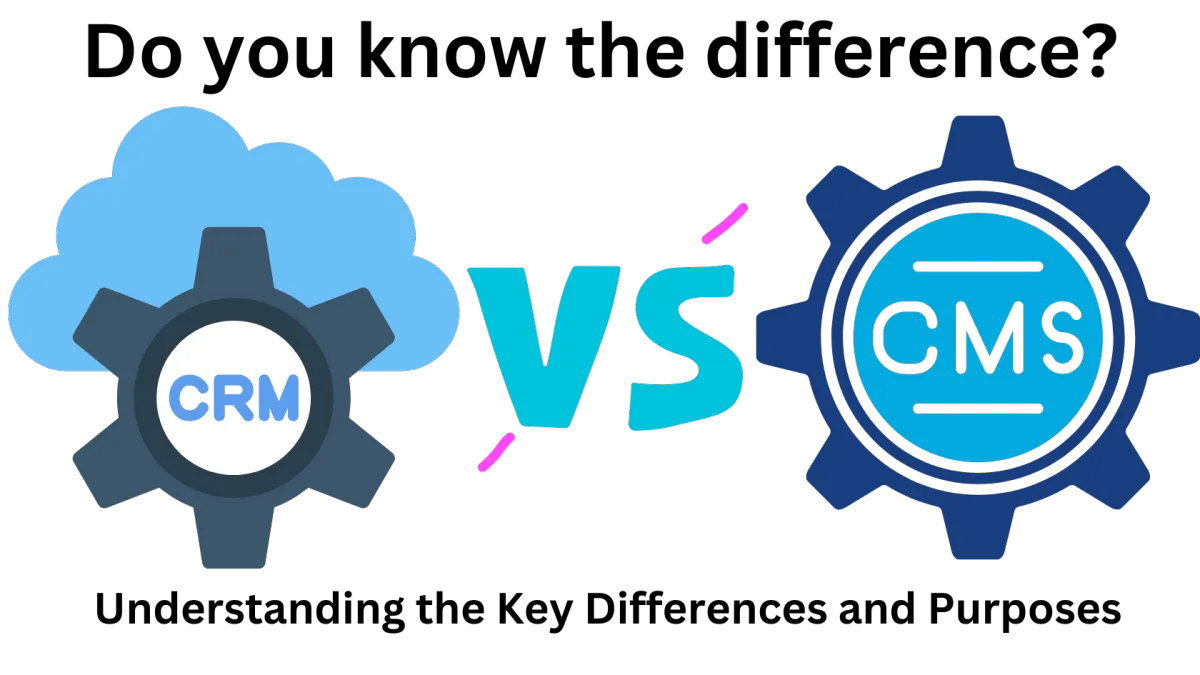Go High Level 360 Educational Blogs: Discover Insights and Inspiration:
Go High Level 360 blogs are meticulously crafted, combining expert knowledge with real-world experiences to bring you content that is not only informative but also engaging. Whether you're seeking guidance, inspiration, or the latest trends, our articles are designed to empower and enlighten. Dive into our collection and embark on a journey of discovery with us, where every story is an opportunity to learn, grow, and excel.

Go High Level 360 Blogs: Discover Insights and Inspiration:

CRM vs CMS: Understanding the Key Differences and Purposes
CRM vs CMS: Do You Know The Difference?
In the rapidly evolving digital landscape, businesses often encounter a plethora of software systems designed to enhance their operational efficiency. Two such systems, often confused due to their overlapping functionalities, are CRM (Customer Relationship Management) and CMS (Content Management System). Though both are quintessential in the modern business environment, they serve distinct purposes and cater to different needs within an organization.

What is CRM (Customer Relationship Management)?
CRM software is an integral tool for managing and nurturing a company's interactions with its customers. It's a technology for managing all your company’s relationships and interactions with customers and potential customers with the ultimate goal to improve business relationships.
Purpose of CRM
The core objective of a CRM is to streamline the processes involved in customer interaction, sales management, and consolidate customer information into a comprehensive database. This centralized database becomes a vital resource for sales and marketing teams, aiding in better understanding and serving customers.
Key Features of CRM
Contact Management: This involves storing exhaustive information about customers, including contact details, communication history, and in some cases, purchase history.
Sales Management: CRMs excel in tracking sales pipelines, leads, and opportunities, providing a clear view of sales activities.
Communication Tracking: Recording and tracking all forms of interactions with customers across different channels such as emails, phone calls, and social media.
Reporting and Analytics: Offering insights into customer behavior, sales trends, and providing predictive forecasting.
Marketing Automation: Many CRMs integrate features for email campaigns and targeted marketing efforts.
Typical Users of CRM
CRMs are primarily used by sales teams, marketing departments, and customer service personnel who require constant access to customer data and interaction history to perform their roles effectively.
Examples of CRM Systems
Popular CRM systems include Go High Level 360, Salesforce, HubSpot CRM, and Zoho CRM.

What is CMS (Content Management System)?
On the other hand, a CMS is a software application or set of related programs used to create and manage digital content. Unlike CRMs, CMSs are not focused on customer relationship management but rather on content creation and management, primarily for websites.
Purpose of CMS
The main goal of a CMS is to provide a user-friendly environment for managing website content. This encompasses the creation, modification, and publishing of digital content in a streamlined and efficient manner.
Key Features of CMS
Content Creation: Tools for creating and editing various forms of web content like text, images, and videos.
Content Storage: Efficiently storing and organizing different forms of digital content.
Publishing Tools: Managing the publication process and organizing content on a website.
User and Permission Management: Control access to different parts of the CMS and manage user roles.
SEO and Social Media Integration: Tools designed to optimize content for search engines and facilitate integration with social media platforms.
Typical Users of CMS
CMSs are predominantly used by webmasters, content creators, digital marketers, and publishers who need to manage website content effectively.
Examples of CMS Systems
Well-known CMS platforms include Go High Level 360, WordPress, Drupal, and Joomla.
Key Differences Between CRM and CMS
While both CRM and CMS are essential in their respective domains, their focus, functionality, and end goals differ significantly.
Focus: CRM is customer-centric, emphasizing managing relationships and interactions with customers. Conversely, CMS is content-centric, emphasizing managing digital content on websites.
Functionality: CRM deals with managing customer-related data, sales, and marketing efforts. CMS, on the other hand, is about creating, managing, and presenting digital content.
End Goals: The ultimate goal of a CRM is to foster better business relationships with customers, enhance customer service, and drive sales. The end goal of a CMS is to effectively manage and present website content, ensuring a positive user experience for visitors.

Go High Level 360 CRM and CMS Platform
Unlock the full potential of your business with the Go High Level 360 CRM and CMS Platform. This unified approach not only streamlines your content management through our sophisticated CMS but also enhances customer engagement with a comprehensive CRM system. Experience the next level of customer relationship management that covers every aspect of your business interactions.
Our CRM platform includes a robust suite of features designed to optimize your business operations and customer relationships:
Contact Management: Maintain complete records of customer interactions, ensuring every team member has access to detailed contact histories.
Email and Phone Integration: Seamlessly connect your communication platforms to keep your team in sync and your responses timely.
Sales Team and Customer Opportunity Management: Manage and analyze your sales opportunities and team activities to maximize business growth.
Lead Management: Differentiate and prioritize leads based on quality and engagement to enhance conversion rates.
Sales Analytics and Reporting: Gain insights into your business with detailed analytics and customizable reports.
Workflow and Approvals: Streamline processes and maintain control with adjustable workflow settings and approval hierarchies.
Territory Management: Organize your sales efforts geographically to optimize regional sales strategies.
Integration Capabilities: From social media to billing systems, our CRM integrates seamlessly with a variety of platforms, enhancing your business's connectivity and efficiency.
By integrating CRM and CMS, you can transform your business operations, making them more streamlined and effective. Our platform also offers scalable solutions, making it suitable for businesses of all sizes. With the added benefit of a 30-day free trial, you can experience firsthand how our CRM and CMS platform can transform your business.
Sign up today for our exclusive free trial and start maximizing your business potential with our integrated business solutions. Discover how you can improve customer relationships and optimize your digital content, setting your business on the path to transformation and success with our CRM and CMS platform.
Embrace efficiency, drive engagement, and propel your business to new heights. Your journey to business transformation begins here!
Search Blogs By Categories
Subscribe to Gain Access to Our
Monthly Newsletter & Free Resources
Want to get access to even more resources? Enter your information
LEGAL
TOOLS
ABOUT
FOLLOW US
HELP
870 Big Buck Run Road
Ft. McKavett, TX, 76841


